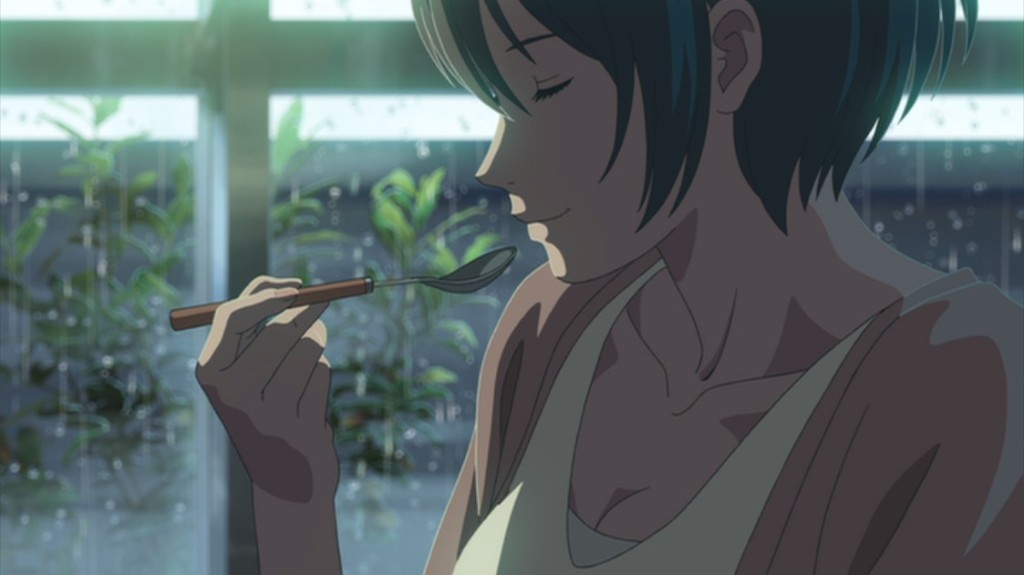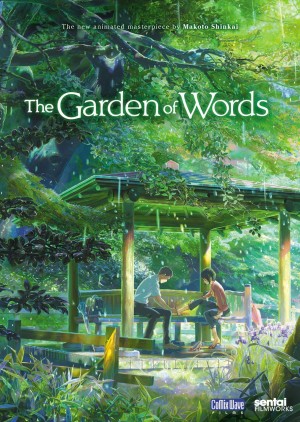The Garden of Words (2013)
Voices of Kana Hanazawa and Miyu Irino. Directed by Makoto Shinkai.
Available on DVD at Amazon
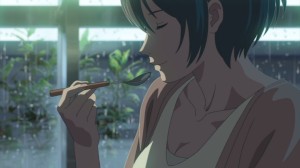 The Garden of Words (言の葉の庭, or Kotonoha no Niwa) is a Japanese animated movie that, to its great credit, continues one Japanese cinematic tradition and, to its great discredit, follows another. The animation is almost mind-blowingly beautiful, at times startling in its realism and at others so pretty and perfect that it has to be the work of an imaginative, artistic hand. Even for Japanese animation, it’s visually outstanding, and a worthy continuation of Japan’s animation traditions.
The Garden of Words (言の葉の庭, or Kotonoha no Niwa) is a Japanese animated movie that, to its great credit, continues one Japanese cinematic tradition and, to its great discredit, follows another. The animation is almost mind-blowingly beautiful, at times startling in its realism and at others so pretty and perfect that it has to be the work of an imaginative, artistic hand. Even for Japanese animation, it’s visually outstanding, and a worthy continuation of Japan’s animation traditions.
Takao Akizuki is a fifteen-year-old high school student, living with an adult brother and a single mother who disappears for days at a time and leaves her sons to fend for themselves. During his mother’s absences, and (one assumes) even when she’s around, Takao assumes many of the household responsibilities, including preparing dinner for the family. Yet he is a far less conscientious student, choosing to take the long way to school on rainy mornings so he can enjoy the beauty of a large public garden (The Shinjuku Gyoen National Garden, according to Wikipedia) and work on sketches of shoes he plans to make someday.
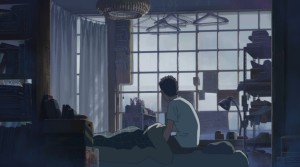 Takao dreams of being a shoemaker, a fantasy that distracts him from classroom lessons and the drudgery of his home life. When he encounters Yukari Yukino, a pretty twenty-something woman, in a gazebo in the garden on one rainy morning, Takao at first barely acknowledges her presence, focusing on his sketches while she, in this early morning hour, makes a meal of beer and chocolate. As they share the shelter of the gazebo on subsequent rainy mornings, they get to know each other, in a way, as Takao shares his dreams and Yukari shares an encouraging word, a sympathetic ear, and very little of her own life.
Takao dreams of being a shoemaker, a fantasy that distracts him from classroom lessons and the drudgery of his home life. When he encounters Yukari Yukino, a pretty twenty-something woman, in a gazebo in the garden on one rainy morning, Takao at first barely acknowledges her presence, focusing on his sketches while she, in this early morning hour, makes a meal of beer and chocolate. As they share the shelter of the gazebo on subsequent rainy mornings, they get to know each other, in a way, as Takao shares his dreams and Yukari shares an encouraging word, a sympathetic ear, and very little of her own life.
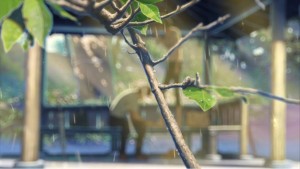 The first forty minutes of the film is dedicated to the exploration of this friendship, and it is beautiful and poetic and possibly inappropriate, and colored with so much sadness and bittersweetness that, like so much great Japanese art, it made me want to weep for my own loneliness and impermanence. There is a predominant Japanese aesthetic that finds beauty in the fleetingness of every moment: a black bird on a high-rise is bathed in red light for a moment, is seen as its natural self the next moment as the light blinks out, then takes flight, circles the building, and is not seen again. A raindrop clings to a green leaf, then trickles slowly down its length until it clings to the leaf-tip, growing in size until its weight pulls the leaf slightly toward the muddy earth before letting go and splashing into the puddle below, releasing the leaf that springs back to its former position to await the next drop. Director Makoto Shinkai takes the time to share these moments and a hundred others, leaving it to the viewer to interact with them however they will, and it’s a beautiful experience.
The first forty minutes of the film is dedicated to the exploration of this friendship, and it is beautiful and poetic and possibly inappropriate, and colored with so much sadness and bittersweetness that, like so much great Japanese art, it made me want to weep for my own loneliness and impermanence. There is a predominant Japanese aesthetic that finds beauty in the fleetingness of every moment: a black bird on a high-rise is bathed in red light for a moment, is seen as its natural self the next moment as the light blinks out, then takes flight, circles the building, and is not seen again. A raindrop clings to a green leaf, then trickles slowly down its length until it clings to the leaf-tip, growing in size until its weight pulls the leaf slightly toward the muddy earth before letting go and splashing into the puddle below, releasing the leaf that springs back to its former position to await the next drop. Director Makoto Shinkai takes the time to share these moments and a hundred others, leaving it to the viewer to interact with them however they will, and it’s a beautiful experience.
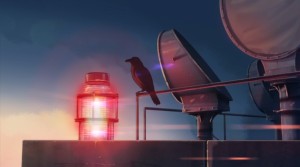 At forty-six minutes in duration, it is about as long as a one-hour television episode, minus commercials, and is structured very much like one, except that it is a self-contained story, and those first forty minutes are the stuff of halls of fame, so wonderfully are they sequenced and framed. But those last six minutes are a baffling continuation of another Japanese dramatic tradition: my people (I’m half Japanese) have an embarrassing flair for melodrama, at least in television and cinema. Japan’s is such a reserved society that perhaps it needs exaggerated, comical catharsis in its popular media just to keep itself functioning normally, the way teenaged boys need to joke about sex in order to have any conversation at all about it.
At forty-six minutes in duration, it is about as long as a one-hour television episode, minus commercials, and is structured very much like one, except that it is a self-contained story, and those first forty minutes are the stuff of halls of fame, so wonderfully are they sequenced and framed. But those last six minutes are a baffling continuation of another Japanese dramatic tradition: my people (I’m half Japanese) have an embarrassing flair for melodrama, at least in television and cinema. Japan’s is such a reserved society that perhaps it needs exaggerated, comical catharsis in its popular media just to keep itself functioning normally, the way teenaged boys need to joke about sex in order to have any conversation at all about it.
Whatever the reason (and of course I’m willing to be told I’m completely wrong about this), the resolution of this film is just kind of awful, and it is followed by a closing-credits song whose lyrics tell you how to feel, just in case the melodrama doesn’t explain it blatantly enough. Endure the terrible song, though, if you want to feel better about everything: the director gives us a post-credits sequence that’s much more like the raindrop and the leaf.
The unsatisfactory resolution is enough for me to drop it from a 9 to a 7 out of 10. But it’s definitely worth a look.
